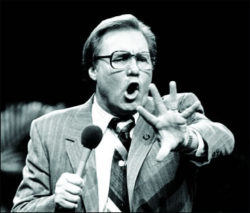Jimmy Swaggart
Called the "King of Honky Tonk Heaven" by Newsweek in 1982, Ferriday's Jimmy Swaggart was America's most popular televangelist in the 1980s.

Courtesy of Flickr.
Jimmy Swaggart is a Pentecostal pastor based in Baton Rouge. Swaggart is pictured here during one of his televised sermons in the 1980s.
Called the “King of Honky Tonk Heaven” by Newsweek in 1982, Jimmy Swaggart was America’s most popular televangelist in the 1980s. At Swaggart’s peak in 1987, when he was preaching from the pulpit at his Family Worship Center in Baton Rouge, Arbitron estimated his weekly U.S. audience at 2.1 million viewers. With his access to Ronald Reagan’s White House and the international reach of the Jimmy Swaggart Ministries, he was a leading figure in the political emergence of the Christian Right. Swaggart’s reputation declined after a sexual scandal broke in 1988. Defrocked by his denomination, the Assemblies of God, he continued as a nondenominational preacher but was implicated in another sex scandal in 1991. Swaggart’s career has been in eclipse ever since.
Born in Ferriday, Louisiana, Swaggart grew up poor in a community without electricity and paved roads. His father, Willie Leon “Son” Swaggart, was a fiddle player who worked for a bootlegger before being drawn with his wife, Minnie Belle Herron, to the Assemblies of God. A Pentecostal denomination, the Assemblies of God measures the faith of adherents by their possession of the Holy Spirit, whose manifestations include speaking in tongues. Music is crucial in the highly emotional services of Pentecostals, and Swaggart’s family was rife with talent. Minnie Belle sang in the choir, and Swaggart’s cousins included rock and country stars Jerry Lee Lewis and Mickey Gilley. Swaggart would become a successful gospel singer, earning several gold records, but resolutely disdained secular music.
Pentecostalism dominated Swaggart’s life from early on. By age nine, he claimed to have spoken in tongues, and within a few years, when Willie Leon established his own church in Ferriday, Swaggart became the pianist. In 1952, he married Frances Anderson, who became his helpmate. Swaggart embarked on a full-time ministry in rural Louisiana, often preaching from the back of a flatbed trailer. Unlike most of the televangelists who became his colleagues and rivals in the 1970s and 1980s, Swaggart seldom sugarcoated his message or tailored his presentation to the expectations of late twentieth-century America. He was an unapologetic and unreconstructed advocate of “old-time religion” and performed in an emotionally fervid style strongly reminiscent of Billy Sunday and the tent revival meetings of an earlier age. He moved easily between pulpit and piano and put on a rollicking, hand-clapping show as he exhorted sinners and excoriated Jews and Catholics, Hollywood and popular music, science and secularism. Swaggart preached the gospel of biblical literalism according to his own interpretation.
In 1961, after more than half a decade of freelance preaching, Swaggart was ordained as an Assembly of God minister. His Family Worship Center in Baton Rouge began modestly, but by the 1970s had grown into a model for megachurches with a campus of buildings and more than a thousand congregants. Broadcasting and astute marketing brought him success. In 1962, he began preaching on radio across the South and purchased a small chain of stations. Television soon followed. By 1975, his weekly telecasts were seen nationwide, and in 1980 he added a daily program. He also built an extensive mailing list. Swaggart’s fiery speaking style drew comparisons to the populism of Huey Long, but his messages were apocalyptic and appealed to an audience uncomfortable with a rapidly changing society.
Swaggart was more careful than some of his rivals in the “electronic church” to document his finances. However, he was clearly a pitchman with a large catalogue of merchandise. The Swaggart Ministries enjoyed a lively revenue stream from the sale of his gospel recordings along with Bibles and religious texts, calendars, and Christmas cards and trinkets. His fervent denunciations of pornography led some to wonder about his own sexual obsessions even before the hidden side of his private life came to light.
Swaggart’s ongoing relations with prostitutes surfaced after he exposed a fellow Assembly of God minister, Marvin Gorman, for adultery. Gorman was defrocked as a result. Seeking revenge, Gorman collected photographs of Swaggart’s sexual activities and threatened to expose him unless he publicly recanted his accusations of adultery. When Swaggart refused to respond to the blackmail, Gorman presented his evidence to the Assemblies’ governing body. On February 21, 1988, Swaggart famously proclaimed to his television audience that he had grievously sinned. The Assemblies of God suspended Swaggart, and later, believing him to be unrepentant, defrocked him. Swaggart continued his work under a nondenominational banner, but the adverse publicity sapped his audience and his revenue. In 1991, he was pulled over by a California highway patrolman for erratic driving and was found with a prostitute. In the aftermath, his wife Frances, son Donnie, and grandson Gabriel assumed a more public role in the Family Worship Center and his other ministries. Swaggart’s career as a religious broadcaster continues through the present day, but he never regained the influence he enjoyed during the 1980s.
